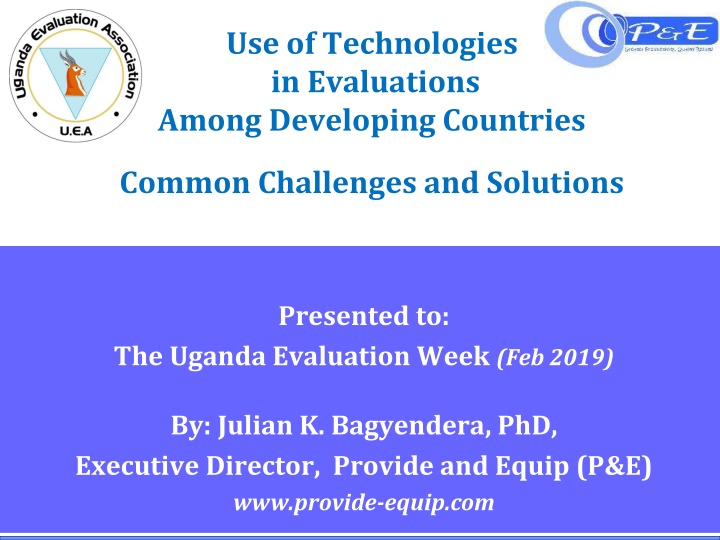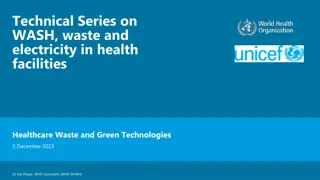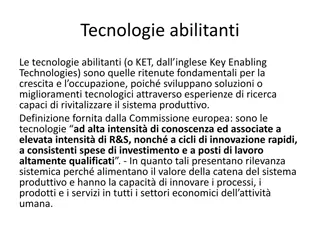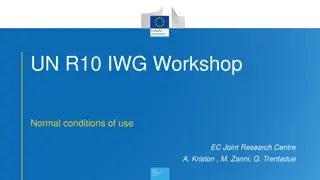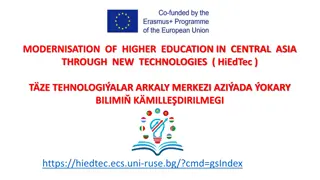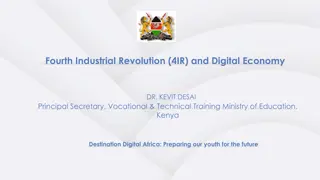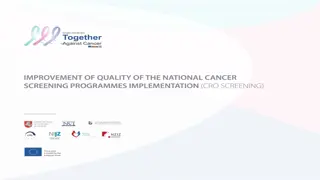Use of Technologies
Developing countries like Uganda face challenges in adopting technology for monitoring and evaluation, with issues ranging from infrastructure to skills. This presentation by Julian K. Bagyendera discusses the use of electronic data collection for greater productivity and quality results, highlighting methodologies and findings from a meningitis vaccination coverage survey conducted in Uganda.
Download Presentation

Please find below an Image/Link to download the presentation.
The content on the website is provided AS IS for your information and personal use only. It may not be sold, licensed, or shared on other websites without obtaining consent from the author.If you encounter any issues during the download, it is possible that the publisher has removed the file from their server.
You are allowed to download the files provided on this website for personal or commercial use, subject to the condition that they are used lawfully. All files are the property of their respective owners.
The content on the website is provided AS IS for your information and personal use only. It may not be sold, licensed, or shared on other websites without obtaining consent from the author.
E N D
Presentation Transcript
Use of Technologies in Evaluations Among Developing Countries Common Challenges and Solutions Presented to: The Uganda Evaluation Week (Feb 2019) By: Julian K. Bagyendera, PhD, Executive Director, Provide and Equip (P&E) www.provide-equip.com
Presentation Outline Background Why electronic data collection? Methodology Findings Conclusions Recommendations 2 Greater Productivity, Quality Results
Background Uganda is among the developing countries embracingthe use of technologies in monitoring and Evaluation (M&E) This is however not without challenges, which range from issues related to infrastructure, technology and soft skills Provide and Equip (P&E) is an M&E consultancy firm founded in Uganda P&E employs both electronic and manual data collection systems depending of the preference of the client and availability of funds 3 Greater Productivity, Quality Results
Why electronic data collection? Faster data collection eliminates time for writing responses Faster compilation eliminates the time for separate data entry Stronger data quality assurance - inbuilt data quality checks No transcription errors that are usually introduced during data entry 4 Greater Productivity, Quality Results
Methodology P&E used tablets programmed with Open Data Kit (ODK) to conduct a meningitis vaccination coverage survey among 39 districts in Uganda, in July 2017 The sampling frame of the National Population and Housing Census 2014, obtained from the Uganda Bureau of Statistics (UBOS), served as the primary sampling frame A two-stage stratified cluster sampling was used At the first stage, Enumeration Areas (EAs) were selected using probability proportional to sample size (number of households) 5 Greater Productivity, Quality Results
Methodology A sample of 702 EAs from 39 districts was obtained, thus an average of 18 EAs per district A total of 59,519 households were listed; 4 households were randomly sampled per EA using systematic sampling, thus making a total of 72 targeted households per district Data was collected on all individuals aged 1 to 29 years that were targeted for meningitis vaccination A total of 2,764 households were covered while 10,749 interviews conducted 6 Greater Productivity, Quality Results
Findings/Results The following challenges were noted : Limited knowledge of the technical content by the ODK Programmer was very time consuming and influenced the kind of relevant inbuilt data validation rules Pretesting the ODK tool once was not sufficient; the ODK tool needs be pretested at least 3 times and by different users to ensure adequacy of data validation rules 7 Greater Productivity, Quality Results
Findings/Results challenges were noted : Limited skills among some Research Assistants (RAs);- finalising the tool and saving on the server proper handling of the devices accuracy in recording GPS coordinates Unreliable supply of electricity in upcountry towns - tablets running out of battery Although the ODK enabled faster household listing, sampling was very cumbersome and time consuming Automating sampling was a handy innovation used by P&E 8 Greater Productivity, Quality Results
Conclusions The level of grasping the technical content of the tools and logical flow of questions for both the Programmer and RAs largely determines the effectiveness of electronic data collection Rigorous pretesting of the programed e-tools is essential to ensure the logical flow of questions, right skip patterns, and appropriate validation rules 9 Greater Productivity, Quality Results
Recommendations i. The key personnel should thoroughly orient the programmer on the technical content of the survey in order for them to appreciate faster the required validation rules for automation ii. The key personnel should train and re-train the data collection team - include role-plays in the training for proper electronic data collection. The RAs have a good mix of those experienced in e-data collection to support the rest 10 Greater Productivity, Quality Results
Recommendations ii. The RAs should have a variety of power backup and saving options including: portable power backup devises, disable some functions when not in use e.g. location and data and locating places with solar or generators such as health centers and hotels for charging opportunities in case there are power cuts iv. The supervisors should perform regular reviewing of data as it is being submitted to the server for completeness and accuracy v. The Programmer should auto-program sampling that its done electronically 11 Greater Productivity, Quality Results
12 Greater Productivity, Quality Results
